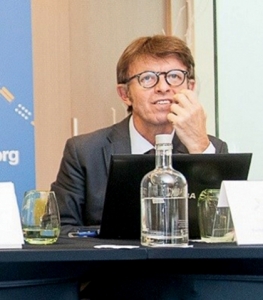Unraveling the Complexities of Hate Speech
Interview
According to the latest report by the Council of Europe’s anti-discrimination body, the European Commission against Racism and Intolerance (ECRI), “hate speech against ethnic and religious minorities, as well as against LGBT persons, continues to be a widespread problem in Georgia” despite certain progress achieved by the country on anti-discrimination policies and legislation. Recently, The Ministry of Internal Affairs of Georgia announced the launch of a Human Rights Department which will also be tasked with monitoring investigation of hate crimes. For the same purpose, the Council of Europe (CoE) recently launched a new project ‘The fight against discrimination, hate crimes and hate speech in Georgia”. The project is financed from the voluntary contribution of DKK 15,000,000 (approximately €2 million) made by the Government of Denmark. GEORGIA TODAY spoke with Stephano Valenti, External Relations Officer at the European Commission against Racism and Intolerance, about the short and long-term goals of this project.
What are the mechanisms for fighting hate speech?
One is legislation. There is antidiscrimination legislation, and that is a very good step forward, but in general terms, it’s not only a matter of just having it but also implementing it. An example of this is if the police fail to classify a crime as a hate crime. We are there to help them with training, but the main battle should focus on raising awareness of what hate speech is; understanding that hate speech is not tackled only by limiting freedom of speech and understanding why it’s dangerous. Such knowledge is needed for all stakeholders, not only the government, but also in civil society. Media campaigns, and the work of the Ministry of Education, can help in this regard.
How do you envision fighting hate speech against the LGBT minority?
Some NGOs, even the Public Defender’s Office, have been working to tackle the issue of parliamentarians using hate speech, by creating a code of ethics which provides a number of sanctions, like suspension, for hate speech use. This is to be discussed at plenary level. Then comes the involvement of sports and religious leaders.
The Church is firmly against the LGBT issue, from the perspective of faith. Yet you say they should fight hate speech. How do you see this working in practice?
We don’t come with an instruction manual for this as all sensitivities must be taken into account. This is our first mission, to be followed by careful assessment to establish a baseline. We have four years and will implement initiatives step-by-step. Study, then the constitution of the steering committee, and then the launching of the project.
Are you going to meet religious leaders?
No, not this time. I don’t think it’s for us to meet them, though I believe not involving them would hamper the effectiveness of the campaign. But this has to be studied. It needs a more inclusive approach.
The Danish government is funding the project with a sizeable sum. How big is the scope of the project and how big do you see the impact being? What would be a realistic expectation?
The role of the CoE is to coordinate. Media outlets are used to engage audiences and monitoring evaluations will be conducted. At the end of the year, there will be an overall evaluation of the results achieved. Realistically, we can have a process moving towards achieving the desired legislative changes. You need to lobby parliamentarians, government, and numerous stakeholders. Sometimes, the intervention of international organizations can give impetus to the government to make changes. So, this is one of the expectations. The other, for example, is to give good examples to other countries.
In Georgia, there has been online sensitivity from conservative forces to online criticism of the Church. Recently, we saw the UK Prime Minister proposing a bill making offending somebody online punishable. What’s your take on this?
The CoE publish general policy recommendations with guidelines on how the law should be written in such cases: precisely in order to avoid misuse of the law. Hate speech can be used against freedom of expression and there should be very precise definitions, monitoring systems and also a special judiciary which is aware of this and can intervene, if necessary. The problem is that you cannot take everything to the judiciary because it will explode into extremes. Hate speech is not always easily definable. If I say something on a microphone as a CoE representative, that doesn’t have the same impact as if I am saying the same thing off record. If you say something online, the multiplication of the message is completely different from when something is said to just one person. You have to see hate speech as the consequence of your speech, the likelihood that your hate will create discrimination and violence. It depends on the hater and on the victim: if the hater is very powerful and the victim very weak, it is most likely classifiable as hate speech. Our aim is to provide support to the government in better understanding this complex issue and working to create the right kind of legislation.
Vazha Tavberidze












